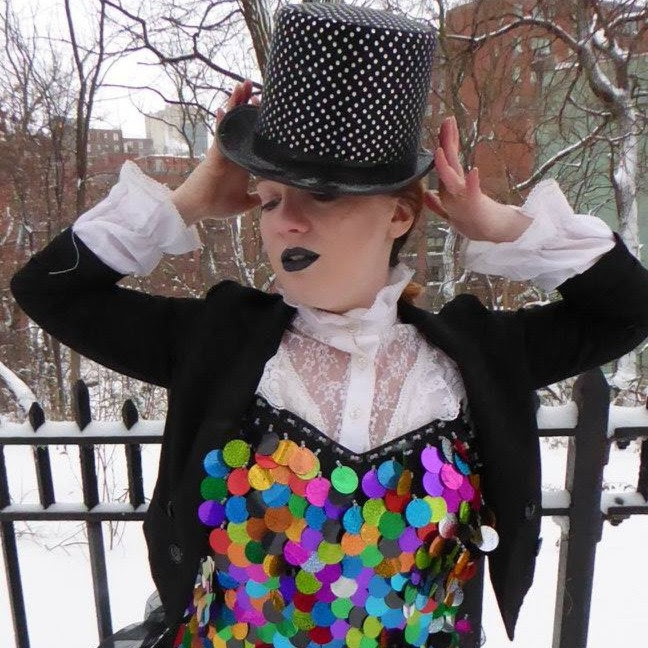The Miles Nadal Jewish Community Centre in Toronto is celebrating Pride Month with a Zoom lecture by queer multidisciplinary stage artist Stav Meishar, who will be exploring the intersection of Jewish and queer identities in film and television.
Meishar will be analyzing the texts of the TV series Angels in America and Transparent and the movies Bent and Yentl. Angels in America, originally a two-part play, examines AIDS and homosexuality. The focus of Transparent is transgender parenting.
The main character of the movie Bent, based on a play, is a prisoner in a Nazi concentration camp. While he’s gay, he’s not Jewish. “Someone advises him to say he’s Jewish because homosexuals have it worse, which of course created a big debate in the Jewish world when the play premiered,” Meishar said.
Yentl, set in Poland in 1873, was inspired by the Isaac Bashevis Singer’s story Yentl: The Yeshiva Boy. Starring and directed by Barbra Streisand, Yentl tells the story of a Jewish girl who dresses and lives like a boy so she can study Talmud.
In her lecture, Meishar will analyze these works through the lens of intersectionality. “It’s basically the idea that we belong to multiple communities and we fight for multiple causes. When I talk about queer characters in Jewish film and TV, or depending how you prefer it, Jewish characters in queer film and TV, it’s really about the intersection,” she said.
Throughout history, in different eras and countries, both LGBTQ+ communities and Jews have been on the margins of society, whether because they wanted to or whether they had to to survive, she said.
“Intersectionality is a very interesting place to look at. What does it mean to have a history of people that were persecuted just for being who they are and what kind of person do you become when you have not one of those histories behind you, but two? And this is where I think the talk gets very interesting, looking at where the queerness and the Jewishness meet each other and how they contrast and complement.”
Speaking about the character Yentl, who wore men’s clothing to get the freedom of choice to study, Meishar said queerness isn’t always about sexuality or gender.
“It’s about breaking the norms. It’s about forging your own path. When I think of Yentl as a queer character, it’s not necessarily because I think she is a man trapped in a woman’s body. I don’t think she was, but I do think she was queer because she wanted to do something that women couldn’t do and she did what she had to do to get there.”
Meishar’s lecture includes video clip excerpts and viewers are invited to share their thoughts on such topics as what it means for the characters in these works to be both Jewish and queer.
Her lecture comes from a paper she wrote for a course on feminism in film and television while she was studying gender studies and Jewish studies for her undergraduate degree at the New School in New York. Born in Israel, Meishar is currently based in Bristol, U.K. With the onset of COVID, her live performances have been curtailed.
Before the pandemic, Meishar spent two decades performing on theatre and circus stages in Hebrew, English and Yiddish, in Israel, the United States and Europe. Her most recent project, The Escape Act: A Holocaust Memoir was a one-woman show mixing puppetry, theatre and circus. It’s based on the true story of a Jewish acrobat who survived the Holocaust hiding at a German circus and examines questions of anti-Semitism and multigenerational trauma.
She recently completed the first year of an online master’s degree in contemporary circus practices with the Stockholm University of the Arts, and she’s working on a book about a Jewish circus family.
Meishar’s lecture, at 2 p.m. on June 6, is co-presented as part of Pride Month by Adult Daytime Culture and Education, Israeli Connection at the MNjcc, LGBTQ+ at the J and the Toronto Jewish Film Society. It’s presented in partnership with Pride Toronto and sponsored by the UJA Federation’s Emerging Communities Committee. To register, visit mnjcc.org or call 416-924-6211.
More Pride Month activities:
Queer Jewish Arts Festival, JCC of Greater Baltimore, June 1-13
The festival celebrates LGBTQIA+ stories and experiences in film, theatre, music, literature and dance, with a focus on queer Jewish artists who are making art with Jewish content. The events will amplify intersectional identity and creative expression.
Beth Tzedec artist-in-residence Aviva Chernick hosts a virtual roundtable with a group of queer Jewish Canadians working in the arts: Diane Flacks, Sigal Samuel, Daniel Sarah Karasik and Evan Tapper. This is a conversation about the intersection between Jewish, queer and creative identities.







